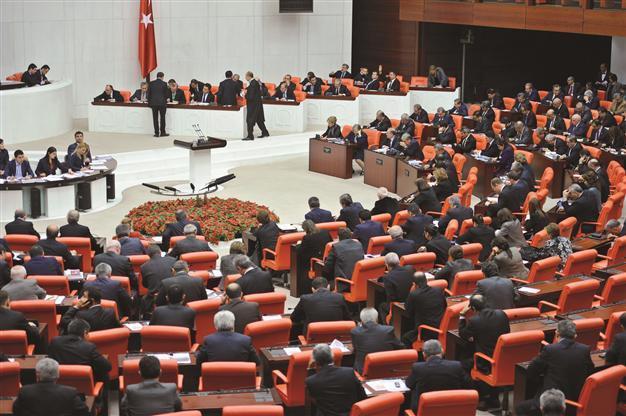‘Mother tongue’ causing constant crisis at Turkey's panel
ANKARA – Hürriyet Daily News

A discussion between the CHP’s Rıza Türmen and the MHP's Oktay Öztürk turned into a harsh polemic, with the two accusing each other of ‘separatism.’ DAILY NEWS photo, Selahattin SÖNMEZ
At a time when the issue of the right to education in an individual’s mother tongue has become a critical issue in the ongoing peace process, another crisis has erupted over the issue at a meeting of Parliament’s Constitution Conciliation Commission.
With the main opposition Republican People’s Party (CHP) appearing to be inclined to soften its stance regarding education in languages other than Turkish at a session held on Sept. 16, a discussion between the CHP’s Rıza Türmen and the Nationalist Movement Party’s (MHP) Oktay Öztürk turned into a harsh polemic, with the two accusing each other of “separatism.” The row eventually prompted Öztürk to storm out of the meeting.
MP storms out of meetingShowing photographs of students working in front of a school in the Ergani town of the predominantly Kurdish-populated southeastern province of Diyarbakır, Türmen suggested that the issue of educational language and poverty should be handled together, and that policies should be designed accordingly.
Such presentation evoked an angry comment from Öztürk.
“You served as judge in Europe, you may not be explaining your point well, but you are engaging in separatism,” Öztürk said, referring to the fact that Türmen has served as a judge at the European Court of Human Rights (ECHR).
“You are the one who is engaging in separatism. I return [your accusation]. Voicing these problems is not separatism, ignoring these problems is separatism,” Türmen said in response. Öztürk then left the meeting.
In a previous proposal submitted to the Commission, the CHP offered a clause resembling the current Constitution, stating: “No language other than Turkish shall be used as the language of education in institutions of training and education.”
The main opposition party has been planning to amend its proposal with an expression solely stating: “The language of education is Turkish.”
If this proposal is adopted, it would bring the CHP closer to a proposal by Peace and Democracy Party (BDP) deputy Sırrı Süreyya Önder, which has already been presented to the Commission. Önder offered the “Bulgarian model,” which would make learning Turkish an obligation, while also guaranteeing the freedom to education in one’s mother tongue.
